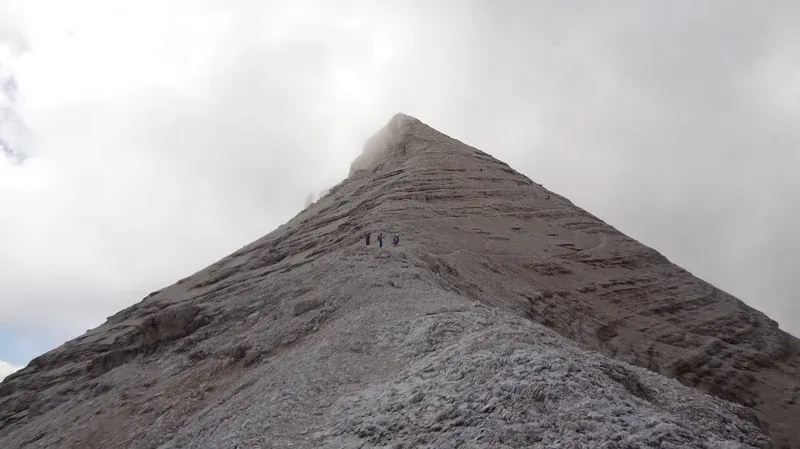So this is something personal and I have this issue every time. Indeed, my nose runs whenever I begin hiking and it doesn’t stop until I finish and get back from the mountain.
A runny nose in the mountains is a normal body reaction to the surrounding cold and dry air. It has a medical term for it and this is vasomotor rhinitis. Some people react more than others, I am one, and if you are in the same group, most likely you cannot prevent it. So try to learn how to manage it.

So why does my nose run in the mountains?
In decades of mountaineering, I have had lots of opportunities to practice how to blow a snot rocket. It works fine as long as there are no people around.
But it may be quite embarrassing because I produce a sound that is close to what you hear from marmots high in the mountains.
When I was descending Tofana Di Roses from the picture below, there were many people around in the lower part of the route between two huts. This was one of the recent occasions for my embarrassing nose-whistling practice.

Anyway, I know that there are several possible explanations for a runny nose. They include allergies from pollen or mold in the air, irritation, common cold viruses.
However, none of them apply to my case. How do I know? Well, when I am back in the valley the same day, I have no issues of this kind. They are gone as soon as I descend.
I have found an article that describes what possibly happens, and most likely this is explanation for my problem.
So in the case of a runny nose in cold weather, and without other symptoms of allergies or illness, most likely this is abut vasomotor rhinitis. I know this phrase sounds complicated for us ordinary mortals, but in any case it is caused by changes in temperature and also possibly of humidity.
When you go high in the mountains, you experience both of these changes. And when this thing happens, I mean vasomotor rhinitis, the body produces clear nasal discharge.
In this video you can see how to blow a snot rocket, this is close to what I do all the time:
Why temperature matters?
This is about a self-protecting mechanism which we have in our body, or better to say in our nose. Extra mucus is produced when it is cold, and this is to warm and moisturize our nasal passages and to protect bronchioles in our lungs from damage.
There is also condensation in the nose when we exhale and release warm and moist air into the cold areas in the nose. This mixes with the mucus that is also produced.
A bit more about possible explanations
Some suggest that elevated allergen levels on outdoor trails may irritate our nasal linings, leading to increased mucus production and a subsequent urge to blow our noses. But, if this were the case, wouldn’t we all be unwittingly allergic to this?
A more plausible explanation is related to intensified breathing patterns, triggering irritation in mast cells, which release chemicals like histamine. This process may result in a runny nose or itchy eyes during exercise.
In tandem with heightened respiration and cardiac activity during hiking, the heightened stimulation of nasal sensors compels us to seek relief, prompting the need to clear nasal passages and alleviate exercise-induced irritations.
How to prevent runny nose in the mountains?
From what I have found on the Internet, some claim you should avoid breathing in cold air. Apparently, covering your nose and mouth with a wrap or scarf should solve the problem.
But I cannot stand covering nose and mouth, so I am sure I shall not try this. Some nasal sprays might help, you can buy them without prescription and they may be useful also if you have nose bleeding effect on high elevations. One mentioned in the article mentioned above is Atrovent, but this is by prescription only.
Oh yes, I almost forgot, if you have a similar issue, I am sure you have already seen the usual great advice “consult with your doctor”. But I doubt this will help.
How to manage a runny nose
So my guess is you cannot prevent it. Bringing lots of tissue is not really an option, and you cannot throw such stuff around so you would have to collect it in your backpack.
You have seen the video above, practice snot rocket. Just make sure you aim in the right direction.
Summary
All in all, it seems it is normal to have a runny nose in the mountains. Some react more than others to the cold and dry air, and it seems I am one of them.
But as mentioned, I am always perfectly fine in the evening when I am in the valley. So this is not a big deal in any case. If you have the same symptoms, do not overthink it. This is a normal body reaction.
Tell me if you have similar issues and how you do about it, there is a comment box below. For more texts of this type, please check under the category FAQs. Read also my texts about increased urination at high elevations and why you might fart more at higher elevation.
This site is all about mountaineering and outdoor activities, so bookmark it and keep as a reference. I am adding texts here regularly. Thank you for reading. I wish you a nice day.
Leave a Reply